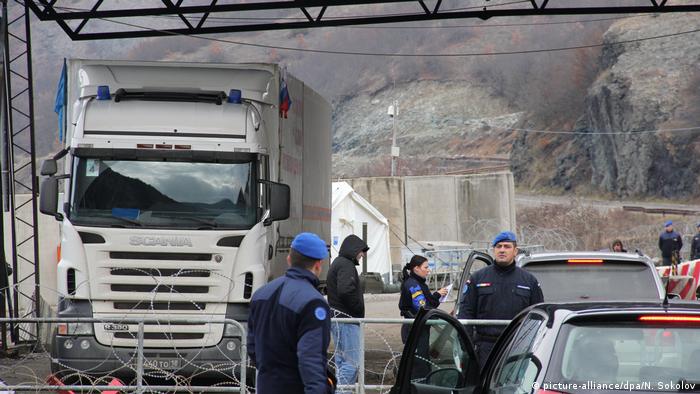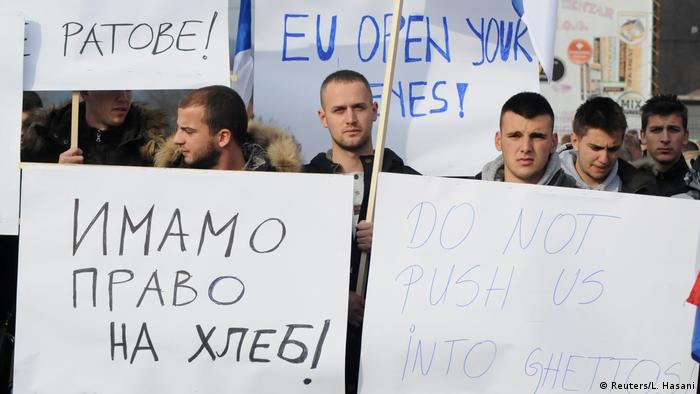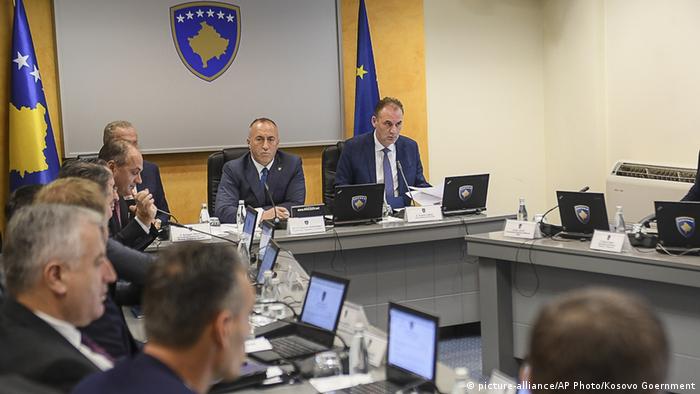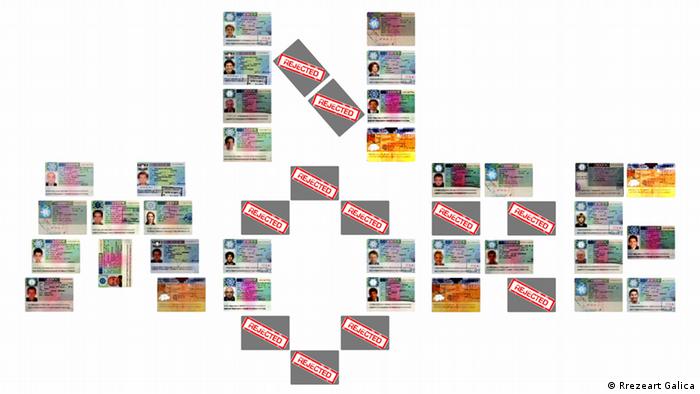The Kosovar government has imposed punitive duties on imports from Serbia and Bosnia-Herzegovina. In Kosovo, the actions find great approval. Germany and the EU are just as little pleased as the neighboring countries.

The bread prices in Kosovo have increased by a third. Of the 70-100 Trucks that pass through the Kosovo border every day, with Goods from Serbia, arrived on Friday, only seven. Nevertheless, the Kosovars cheered, as the Prime Minister Haradinaj announced two days earlier, the punitive tariffs against Serbia and Bosnia-Herzegovina to 100 per cent. In Prishtina, a Banner with the inscription “Today I’m 100 percent state”. The press commentators welcomed unanimously and with great enthusiasm the decision of the otherwise very controversial Prime Minister.
Unanimously, the responses outside of Kosovo were Not only from the countries concerned, self-rejection, but also on the part of the EU-Commission. Outside of Federica Mogherini, and enlargement Commissioner, Johannes Hahn, Commissioner called for an immediate withdrawal of the decision. Similar reactions also came from Germany: “We call on the government in Prishtina to withdraw the decision,” said the Foreign office after a request from the DW. Because the decision of the Kosovo government was in breach of the free trade agreement CEFTA.

Serbs in Northern Kosovo demonstrate against the punitive tariffs against Serbian Goods: “We have a right to bread.”
“Security at risk”
You see, in Prishtina, in a different way: Prime Minister Ramush Haradinaj sent the next day a letter to the embassies in Kosovo, in which the decision was justified. It is based on Annex 1 of article 18 of the CEFTA agreement, according to which each member decisions “for the protection of its own essential security interests”. Haradinaj, the Declaration included a list of actions, with which Serbia is harmful, with the support of Bosnia-Herzegovina, the security of his country.
Including the recent campaign of Serbia, to bring the third party candidacy of Kosovo for Interpol membership to Fail. For the Kosovars it was a big disappointment, especially since far fewer countries, namely only 68, voted for it as hoped – at least 110 States have recognised the independence of Kosovo. Serbia, Kosovo considered as a part of its own territory, recorded the vote as a victory. Previously, the candidacy of Kosovo was a failure for inclusion in the UNESCO. Premier Haradinaj wants to lift the duties, if both countries recognise Kosovo as a state.
Germany responded with a shake of the head
Germany has supported the membership of Kosovo with Interpol. German Chancellor Angela Merkel had assured the Kosovan Prime support.
The Kosova punitive tariffs on Serbia and Bosnia-rises legislative government is now Herzegovina, launches in Germany, however, a lack of understanding. Peter Beyer, Kosovo-Rapporteur of the CDU/CSU parliamentary group in the foreign Affairs Committee, will evaluate this decision also as a Signal against the stabilisation and Association agreement between the European Union and Kosovo. “The Kosovo government will have to repeal these decisions immediately. The normalization is different,” said Beyer in a DW Interview. He pointed out that “trade should be conflicts in the appropriate fora and procedures of a solution”.
The Serbian-Kosovar dialogue at risk
Thus, CEFTA, whose presidency is currently held by the way of Kosovo. On 6. December will be the country that is officially listed there as “UNMIK”, the host of a conference of the Minister for trade and industry. Among the participant-countries, Bosnia-Herzegovina and Serbia. The goal of the Committee is to create, through economic mergers of stability in the Region. Whether or not this is going to be after this decision Prishtinas possible, is questionable. Serbia and Bosnia-Herzegovina have already boycotted the preparatory meeting and announced at the meeting of trade Ministers not to be there.

Premier Ramush Haradinaj and his Cabinet have raised tariffs on imports from Serbia and Bosnia-Herzegovina drastically
Serbia and Bosnia and Herzegovina want to, however, decide, for the time being, no action. However, the President of Serbia Alexandar Vucic made it known that he will not come again for a dialogue with the government of Kosovo, when Kosovo had repealed the duties.
Ill feeling between Pristina and the Serbs in Belgrade and in Kosovo, the RAID on Friday in the North of Kosovo, where Kosovar special forces arrested three Serbs, in connection with the murder of the Serbian opposition politician Oliver Ivanovic in January 2018.
No Visa liberalisation in sight
The confrontation Prishtinas of living in Switzerland Kosovar Journalist Enver Robelli interpreted as a kind of cry for help. Because it is precisely Serbia to support the parallel structures in the North of Kosovo, where majority live Serbs, and harass Kosovars who travel to Serbia. “All of this has been tolerated by the EU and the US,” he says. “Therefore, I see this measure to practice more as a cry for help to the US and the EU pressure on Serbia, with this destabilization policy to stop.”
Another reason may be the signals from the EU countries that it’s coming this year to the planned lifting of the Visa obligation for Kosovo citizens – even though the Visa liberalisation from the EU-Commission and at the end of September and by the EU Parliament decided it was recommended. Many countries, including Germany, seem to have more time with your decision. Peter Beyer, is himself a great supporter of the Visa-liberalisation, not counting before the European elections in may 2019. The discontent in Kosovo is large – especially since it is the only Western Balkan country for which the Visa obligation to enter the Schengen area.

Protest against the Visa obligation: The Kosovar artist Rrezerat Galica has formed from 34 visas to the Slogan “NO MORE”
The green of the Kosovo Rapporteur in the Committee on foreign Affairs, Manuel Sarrazin, stressed that the Kosovars have a right to Visa-liberalisation: “The EU-Commission provided the conditions are met. The Visa-liberalisation tray is not a gift to Kosova and Kosovars, but part of an agreement, which must now be complied with on the part of the EU,” he says Interview at the DW. At the same time, he criticized the escalation policy Prishtinas and appeals to return to both sides in a constructive dialogue. “Without good-neighbourly relations will push the inclusion of both countries in the European Union on the long bench,” says Sarrazin.

